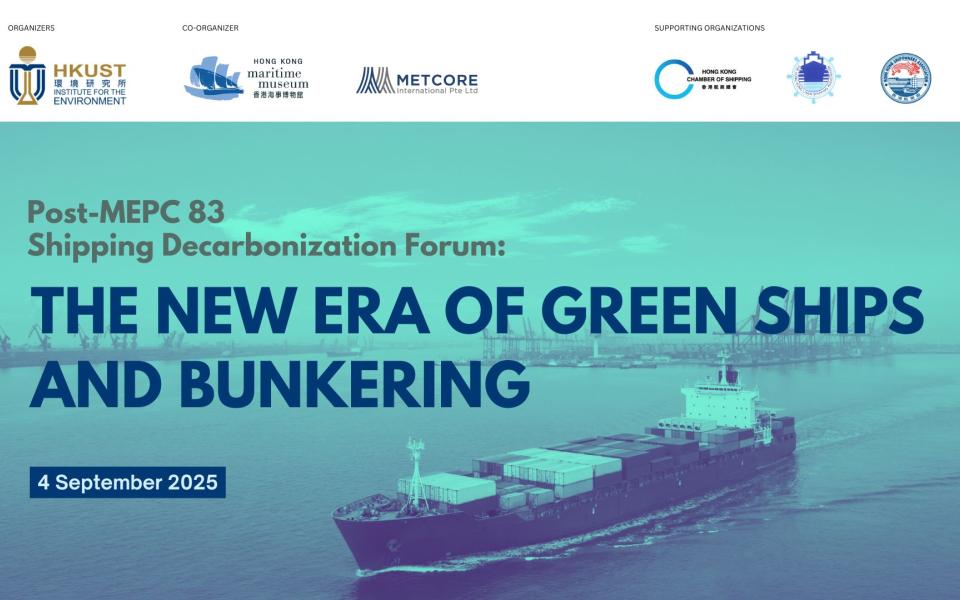Executive Summary
The Post MEPC 83 Shipping Decarbonization Forum, held on 4 September 2025, examined maritime industry responses to IMO's Net-Zero Framework. IMO's carbon pricing mechanism introduces tier-one and tier-two taxation at $380 and $100 per ton, while reward units at $300-350 per ton enable methanol dual-fuel vessels to achieve 7-8 year payback periods. However, policy coordination fragmentation remains the critical bottleneck. Three barriers emerged. First, economic transition complexity: retrofit investments require 20-30 million USD with case-by-case viability assessment. Second, multi-fuel infrastructure challenges: methanol and ammonia serve different segments, yet methanol vessels cannot convert to ammonia operations. Third, policy fragmentation: alternative fuel operations require coordination across marine departments, customs, and fire services currently operating in silos.
Four priorities identified:
1. Establish comprehensive licensing systems following Singapore's stakeholder technical committee model
2. Implement mandatory mass flow meters replicating Singapore's success eliminating 50% dispute rates
3. Create integrated policy frameworks coordinating multiple government departments
4. Develop sustained partnerships with funding like Singapore's $20 million annual GCMD investment
The conclusion emphasized that while retrofitting represents "low-hanging fruit" achieving 10-25% consumption reductions, only unprecedented coordination between government frameworks and industry collaboration through technical committees can successfully navigate maritime decarbonization.
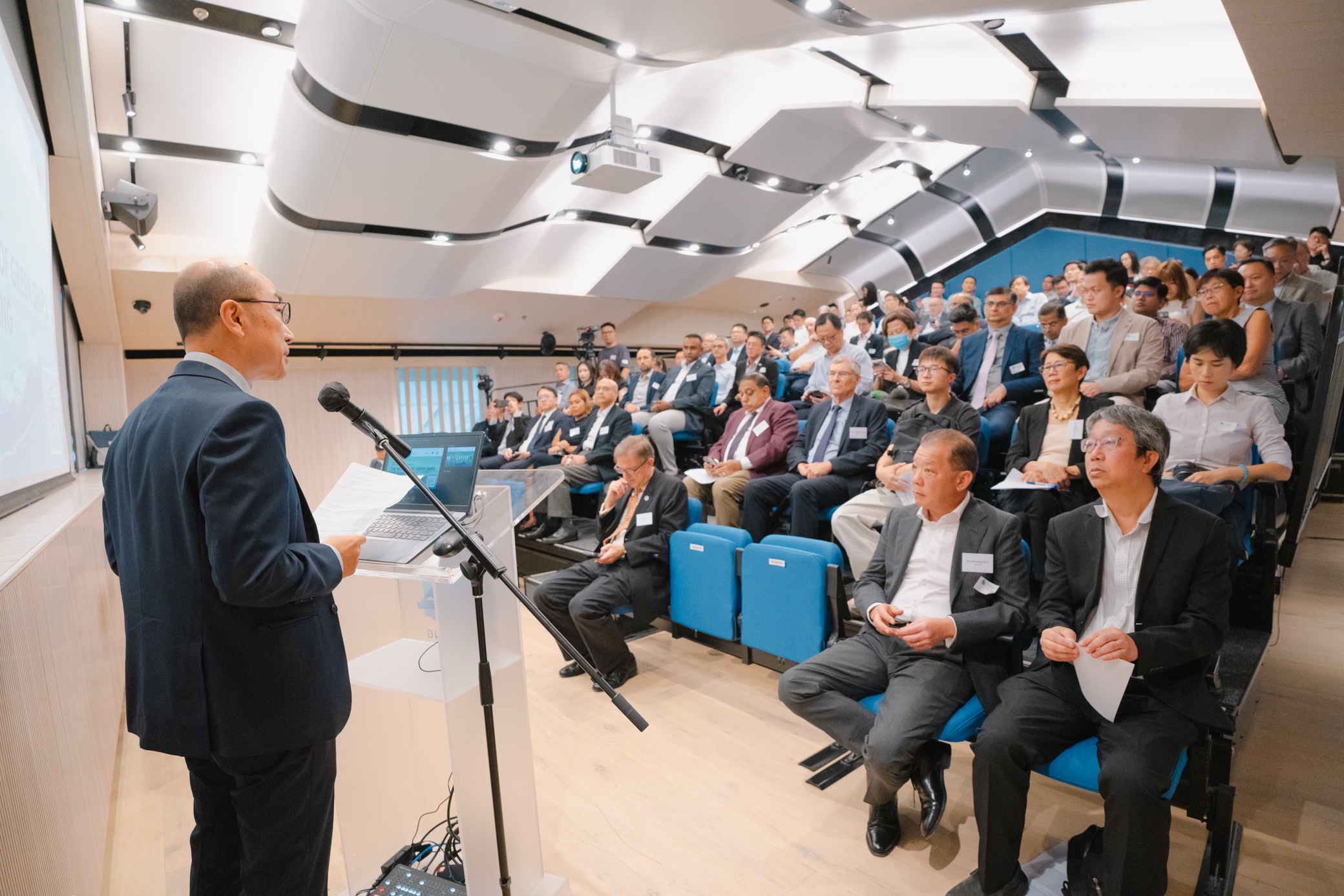
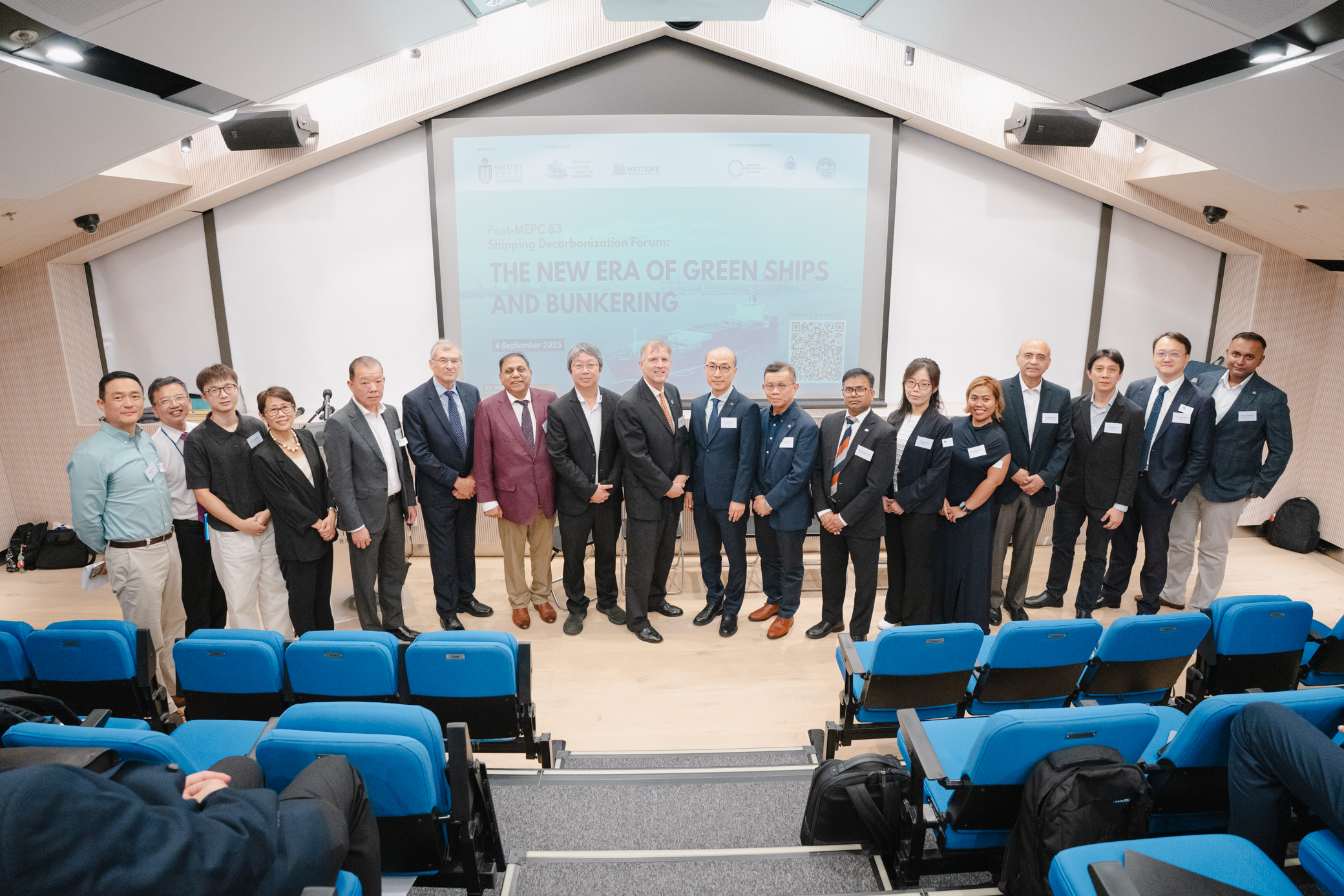
Technical Summary
Panel Discussion 1 : How to retrofit ships in the most cost-effective way for IMO compliance
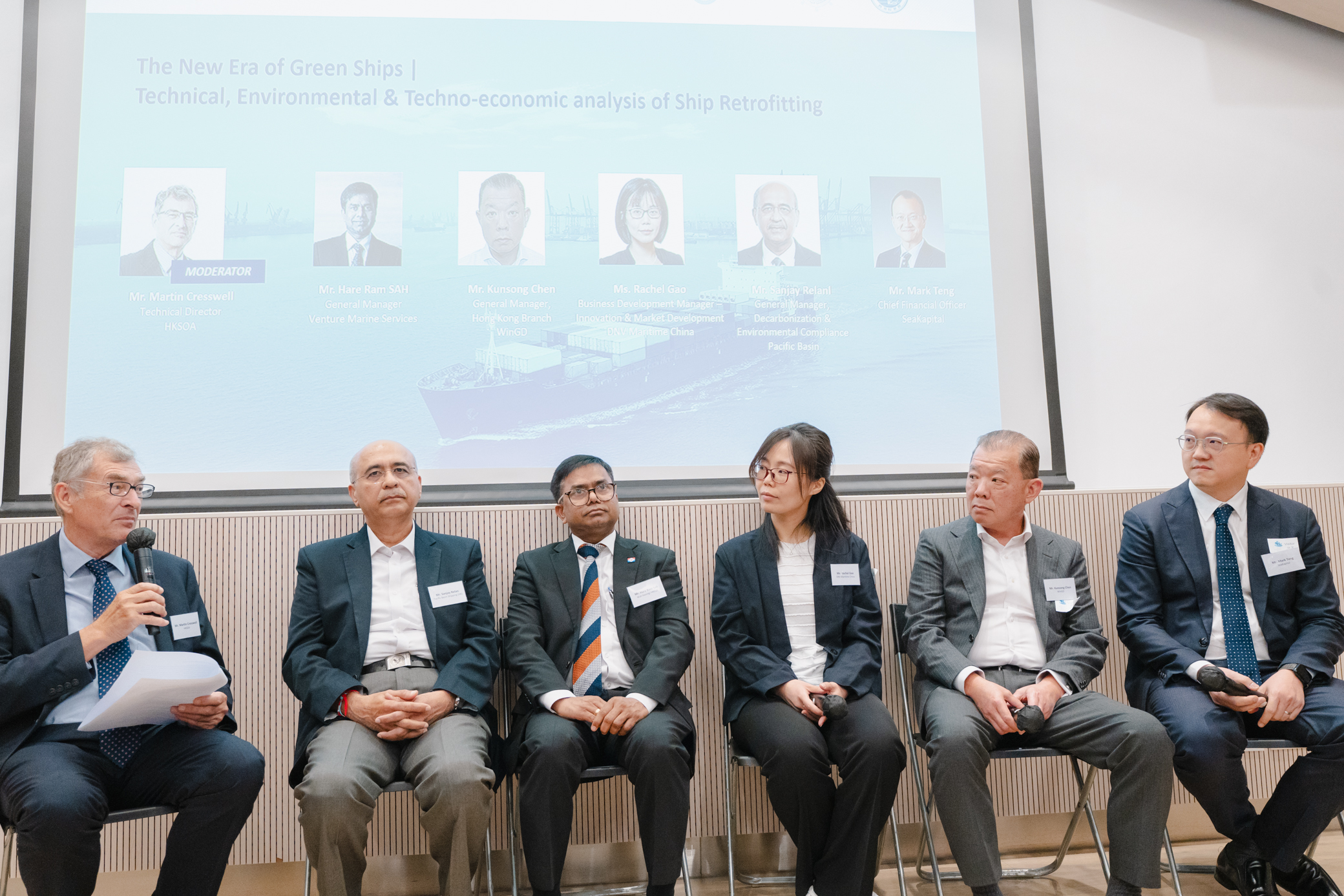
Retrofitting Strategies and Low-Hanging Fruit
- Mr Sanjay Relan (Pacific Basin) emphasized the pragmatic approach to existing fleets: " For existing ships, the only solution is sustainable biofuel to reduce greenhouse gas intensity. We have calculated the minimum amount of sustainable biofuel needed and our bunker team is actively procuring it starting this year. "
- Mr Hare Ram Sah (Wah Kwong ) outlined a comprehensive retrofit strategy: " All solutions will not fit for all types of vessels. Each specific vessel, depending on size, capacity, and trading route, will have its own tailor-made solutions. " He stressed implementing all "low-hanging fruit" during dry dock repairs, including energy-saving devices, 100% hull blasting, and high-quality anti-fouling paint, noting potential savings of 20-25% through combined efficiency measures.
- Ms Rachel Gao (DNV) agreed with Sanjay that biofuel is the only drop-in solution: “we did a biofuel study last year. We collected production data and saw some good positive supply in the market with B30 or B25. The price in last year was good, not so high as expected. But we see already the high demand from all existing fleet, especially when the IMO’s GFI becomes effective. The price won't be good. If we talk about decarbonization at the lowest cost, that will require energy efficiency measures and carbon capture if that is approved by the regulations.”
- Mr Kunsong Chen ( WinGD ) said low hanging fruit for engine retrofit are upgrade of software and engine control system: “We can build a digital twin to monitor the onboard engine and keep the engine in best performance, saving about 1-2% fuel.”
Alternative Fuels and Economic Viability
- Sanjay detailed Pacific Basin's methanol strategy: " We have ordered four methanol dual-fuel ships delivering in 2028-29. The business case came from FuelEU Maritime where we expect to generate surplus compliance balance. " He emphasized the critical importance of IMO reward units: "We calculated that if IMO provides reward units at $300 per metric ton CO2e, we can recover the additional vessel cost in seven to eight years. "
- Mr Kunsong Chen ( WinGD ) highlighted retrofit flexibility: " Methanol retrofitting is easier than LNG conversion because it involves converting to a methanol injection system and keeps the same power output at same RPM. The retrofitting from diesel to methanol takes about one year preparation and only two months in the yard for completion. "
- Mr Mark Teng ( SeaKapital ) compared past with latest ship financing: “When you're talking about things like scrubbers or BWTS systems, it was a very black and white situation. Either you did it and you expected a return on that investment, or you didn't, and you paid for a higher OPEX. But with decarbonization and the many innovations we have heard today, it is a complex optimization problem. It's different for every shipping company, and in fact, for every ship.” He further discussed financing zero or even negative cost energy-saving devices and carbon abatement solutions: “we welcome all these ideas but have to finance all of them as a package. It has to make sense for the underlying business model, not just for our clients but also ourselves. As the retrofitting can’t be removed once done, it’s a refinancing for the entire ship.”
Regulatory Frameworks and Future Outlook
- Mr Martin Cresswell (HKSOA, Moderator) framed the economic reality: " With EU ETS and FuelEU systems already generating over $1 billion in revenue from ships, and midterm measures expected to raise $10 billion annually, reducing greenhouse gases is essential to minimize these compliance costs. "
- Sanjay provided market perspective on fuel availability: " For ships delivered in 2028, I'm confident there will be enough bio-methanol or e-methanol available. We've visited methanol factories in Inner Mongolia and are in discussions with multiple suppliers in China, Europe, Singapore, and the US. "
- Mr Prakash Chandra (FML) from the floor said: “So far you're all talking about methanol. But green ammonia, much cheaper than methanol, will come and be easily available. From next year onwards, ammonia engine is coming.”
- Mr Kunsong Chen ( WinGD ) offered more fuel options apart from methanol and ammonia: “WinGD’s ethanol engine will come true by end of next year, which is methanol optimized. Another possibility for ammonia engine is to convert to LPG in one year’s time. In other words, you have more choices of different new fuels.”
The panel consensus emphasized that while individual efforts are insufficient, the combination of regulatory pressure, technological advancement, and industry collaboration will drive the transition, with early movers positioned to benefit from reward mechanisms while others initially "pay to pollute." Successful decarbonization requires moving beyond individual company efforts toward ecosystem-wide transformation.
Panel Discussion 2 : Bunkering Reimagined: How Standards, Systems, and Stakeholders shape the future
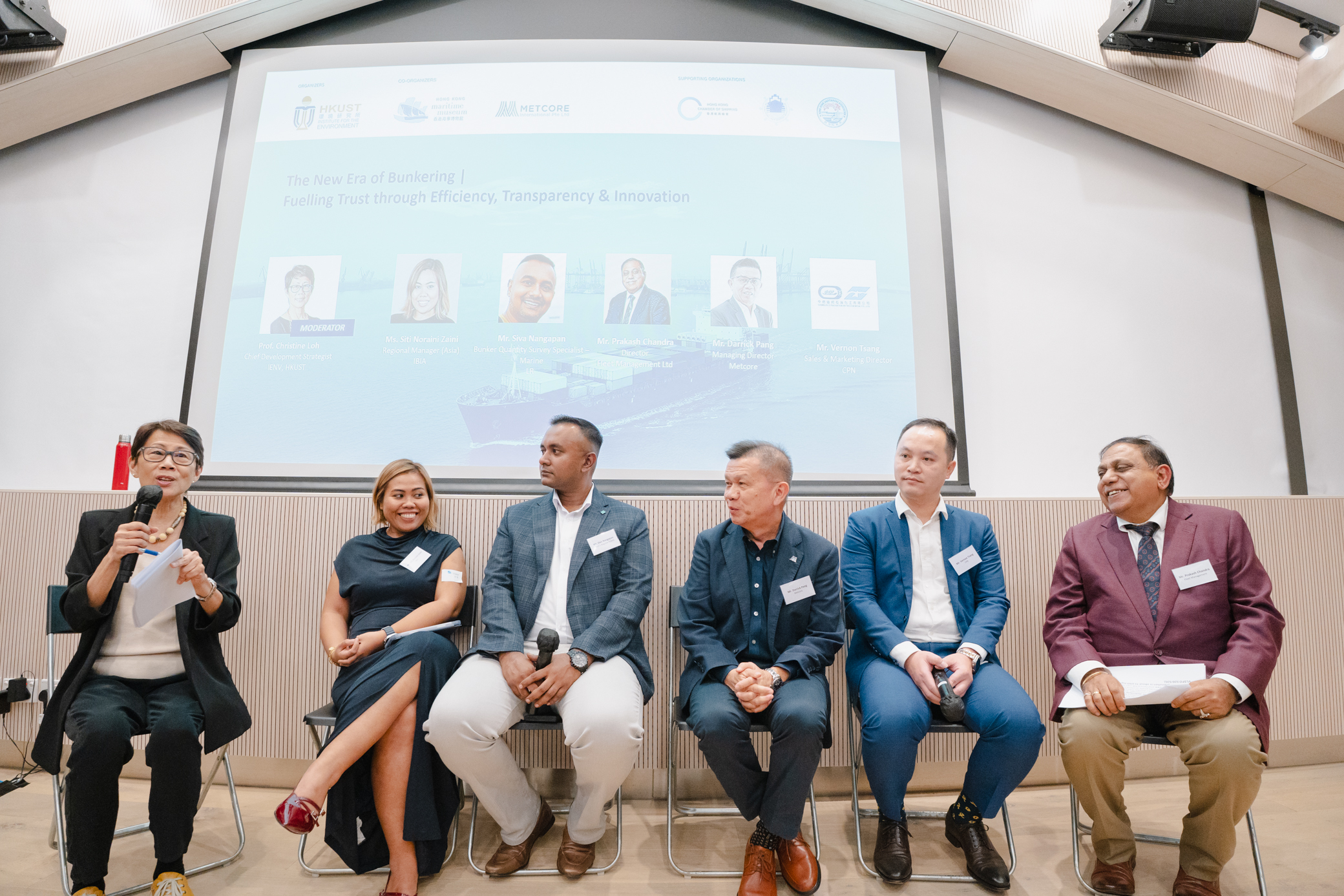
Technology Implementation and Trust Building
- Mr Prakash Chandra (FML ) spoke from a buyer’s perspective what is required from the sellers and government: " From a buyer’s perspective, MFM is not costing more—it's giving reliability, trust, and assurance that the quantity ordered will be delivered. From a seller perspective, bunker companies are at loss because they can no longer do any cheating. We have disputes 50% time . B ut MFM will save minimum two to three hours at every bunkering operation. We need the Hong Kong government to give a very clear guideline and make MFM ’s calibration tamper-proof. We need only a few 3 or 4 companies to do the calibration to minimize chance of making things wrong. MFM supplier should be approved vendor s. W e need a dispute resolution committee , with representatives from the government , HKSOA or HKLSA and bunker association. Everything is made transparent , with bunker readings and c alibration certificate s online. ”
- Mr Darrick Pang ( Metcore ) cautioned against oversimplification: " MFM is not a plug and play solution. Although used for bunker fuel measurement since 2005 in other regions, early projects didn't gain traction. Success came only when Singapore made it mandatory in 2017 with proper standards and clear guidelines . "
Regulatory Frameworks and Licensing
- Mr Siva Nangapan (LR) shared Singapore's learning curve: " Singapore introduced MFM around 2011-2012, but it didn't work initially. The problem was barges without MFM could offer lower prices while those with MFM had higher costs, but there wasn't a licensing system . Once the licensing system came in, it worked. In addition, training is important. When Singapore started to introduce MFM , it was something new a nd normally people fear something that they don't know. "
- Ms Siti Noraini Zaini (IBIA) highlighted the collaborative approach: " Singapore's success came through technical committees involving all stakeholders—suppliers, buyers, associations, testing labs, and government agencies. It's not just about technology; it's about creating a trusted framework through standards, training, and enforcement. "
Implementation Challenges and Solutions
- Mr Vernon Tsang (CPN) outlined the commercial reality: " Some buyers might be reluctant because transparent MFM comes with a price, but we must look beyond short-term costs. Handling disputes wastes time and money—arbitration and court proceedings are expensive. Taking the overall ecosystem’s view, MFM adoption isn't a loss. "
- Prof. Christine Loh (HKUST, Moderator) noted the competitive advantage: " Singapore's experience shows that rather than losing business by implementing strict measurement standards, they actually gained market share because buyers prefer fair, transparent systems. Singapore is now number one globally for bunkers. "
The panel concluded that successful MFM implementation requires government mandate, industry collaboration, proper licensing systems, and comprehensive training programs , with Singapore's model providing a proven pathway for other ports to follow while adapting to local conditions. Many remarked that Hong Kong's maritime community, with its concentration of ship management companies, technical expertise, and strategic location, is uniquely positioned to rapidly implement similar standards while developing its green maritime fuel hub ambitions.
Event Intro
The Hong Kong Special Administrative Region Government (HKSARG) has an ambition to develop Hong Kong into the preferred green maritime fuel bunkering and trading centre in the region, with the Action Plan on Green Maritime Fuel Bunkering promulgated in November 2024. The Mainland-Hong Kong Green Energy Matchmaking Event held on 25 June 2025 provided a collaborative platform for relevant suppliers and companies with demand to catalyse a comprehensive green maritime fuel supply chain and trade, leading to signing of nine memoranda of understanding by various parties. The Marine Department (MD) set up one-stop Services of Green Fuel Bunkering including update of the “Code of Practice - Safety and Operational Guidelines for Bunkering of Alternative Fuels” with Methanol Bunkering Operations and launch of the Green Maritime Fuel Bunkering Incentive Scheme on 30 June 2025.
In April 2025, the IMO Net-Zero Framework of MEPC 83 sets out a global carbon pricing mechanism that could result in extra costs for conventional bunker fuel and accelerate the shift to zero/near-zero (ZNZ) fuels. Apart from HKSARG’s efforts to facilitate supply of ZNZ fuels, demand of new or retrofitted ocean-going vessels (OGV) to bunker ZNZ fuels is equally important. Ship retrofitting for ZNZ fuels and energy efficiency improvements, in addition to newbuilds, and the associated finance have received increasing attention. To this end, the Institute for the Environment of the Hong Kong University of Science & Technology (HKUST) is launching a Research on Finance Model for incentives of Maritime Retrofitting and organizing a seminar titled “The New Era of Green Ships | Technical, Environmental & Techno-economic analysis of Ship Retrofitting”.
HKUST and the maritime industry has brought up to the HKSARG the need for use of Mass Flow Meter (MFM) to ensure accuracy for the bunkered amount of marine fuel and building up the value chain of MFM, including hardware, software and technology providers, certifying and auditing bodies, marine fuel quantity surveyors, etc. to ensure integrity for the bunkered amount. This is especially important for green fuel which is much more expensive than conventional fuel and to maintain Hong Kong as a reputable bunkering centre. Likewise, HKUST would like to continue supporting HKSARG by hosting a seminar on MFM to disseminate this technology and overseas regulations, etc. The seminar has a title “The New Era of Bunkering | Fuelling Trust through Efficiency, Transparency & Innovation”. It explored how MFM systems underpin transparent and accountable fuel delivery, support the transition to green fuels such as methanol and enable a future-ready bunkering infrastructure.
Target Participants: government officials, maritime industry professionals (shipowners, ship managers/ charterers, bunker suppliers, bunker surveyors, shipyards, trade associations, cargo owners, ports, classification societies, energy producers, financial institutions, technology providers, etc.).
| Time | Sessions | Speakers | PPT |
|---|---|---|---|
| Part I – The New Era of Green Ships | Technical, Environmental & Techno-economic analysis of Ship Retrofitting | |||
| 1400 – 1425 | Welcome Opening Speeches/ Photo-taking |
HKMM HKUST/Marine Department (MD) |
|
| 1425 – 1440 |
HKUST Research Plan and Survey on Finance Model for incentives of Maritime Retrofitting |
HKUST | [PPT] |
| 1440 – 1510 | Decarbonization strategies of shipping companies for in-use fleet | OOCL / Wah Kwong (WK) | [PPT (WK)] |
| 1510 – 1525 | Retrofitting to methanol and LNG dual-fuel engine ship | Winterthur Gas & Diesel Ltd. (WinGD) | [PPT] |
| 1525 – 1540 | Tackling Fuel Transition Barriers with Smart Efficiency Strategies | DNV Maritime China (DNV) | [PPT] |
| 1540 – 1615 | Panel discussion I: How to retrofit ships in the most cost-effective way for IMO compliance | HKSOA (moderator), WK, WinGD, DNV, Pacific Basin + SeaKapital | |
| 1615 – 1630 | Tea Break | ||
| Part II – The New Era of Bunkering | Fuelling Trust through Efficiency, Transparency & Innovation | |||
| 1630 – 1645 | Global adoption of MFM system via standardization, policy engagement, and industry best practices | International Bunker Industry Association (IBIA) | [PPT] |
| 1645 – 1700 | Assurance in Green Fuel Bunkering: Compliance and Procedures for MFM Delivery | Lloyd’s Register (LR) | NA |
| 1700 – 1715 | Certification and governing MFM systems across international ports | Metcore | [PPT] |
| 1715 – 1730 | Bunker operations to enhance delivery transparency and customer trust | Chimbusco Pan Nation (CPN) | NA |
| 1730 – 1755 | Panel discussion II: Bunkering Reimagined: How Standards, Systems, and Stakeholders shape the future | HKUST (moderator), IBIA, LR, Metcore, CPN, FML | |
| 1755 – 1800 | Closing Remark | HKUST | |
| No. | Organization / Company | Name of Speaker | Job Title |
|---|---|---|---|
| 1 | HKUST | Alexis KH Lau | Head and Chair Professor, Division of Environment and Sustainability |
| 2 | HKMM | Richard Kendall | Chief Executive |
| 3 | MD | Qiang Shi | Deputy Director of Marine |
| 4 | HKUST | Jiajing Chen | PhD student |
| 5 | OOCL | Roy Hu | Senior Superintendent |
| 6 | Wah Kwong Maritime Transport Holdings Ltd (Wah Kwong) / HKCoS | Hare Ram SAH | General Manager, Venture Marine Services Limited |
| 7 | WinGD | Kunsong Chen | General Manager, Hong Kong Branch |
| 8 | DNV Maritime China | Gao, Yuan Xue Rachel (高原雪) | Business Development Manager – Innovation and Market Development |
| 9 | HKSOA | Martin Cresswell | Technical Director |
| 10 | Pacific Basin Shipping (HK) Ltd. (Pacific Basin) (panelist) | Sanjay Relan | General Manager, Decarbonization & Environmental Compliance |
| 11 | SeaKapital Ltd. (panelist) | Mark Teng | Chief Financial Officer |
| 12 | IBIA | Siti Noraini Zaini | Regional Manager (Asia) |
| 13 | LR | Siva Nangapan | Bunker Quantity Survey (BQS) Specialist - Marine |
| 14 | Metcore (speaker) | Daryl Lim | Quality Manager |
| 15 | CPN | Vernon Tsang | Sales & Marketing Director |
| 16 | Fleet Management Limited | Prakash Chandra | Director, Gas SME |
| 17 | Metcore (panelist) | Darrick Pang | Managing Director |
| 18 | HKUST | Christine Loh | Chief Development Strategist, IENV |
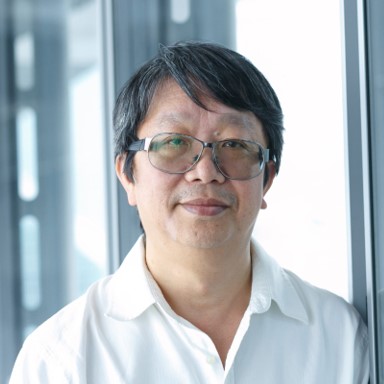
Prof. Alexis Lau
Prof. Alexis Lau, JP, is Head and Chair Professor of Division of Environment and Sustainability, Chair Professor of Department of Civil and Environmental Engineering, and Director of the Institute for the Environment at Hong Kong University of Science and Technology.
Prof. Lau specializes in air quality and health exposure, weather and climate, and environmental policies, with recent focuses on climate adaptation and resilience, as well as shaping the transition to green finance based on climate science. His professional techniques include the analysis of large-scale geophysical datasets, numerical models, and in-situ and satellite remote sensing.
Prof. Lau is a fellow of the Hong Kong Meteorological Society, a founding member of the Hong Kong Climate Change Forum, a scientific advisor to the Hong Kong Observatory, as well as a founding board member and chair of the Qualification Panel of the Hong Kong Institute of Qualified Environmental Professionals. Currently, Prof. Lau is leading the first pan-Pearl River Delta Air Quality study managed jointly by the regional governments under the “Cooperation Agreement on Regional Air Pollution Control and Prevention among Hong Kong, Guangdong, and Macao”. Additionally, he is a member of the Scientific Advisory Group of the World Health Organization Panel on the development of a Global Platform on Air Quality and Health.
Mr. Richard Kendall
Richard Kendall has been the Chief Executive of the Hong Kong Maritime Museum since March 2023, leading the cultural link between the maritime business sector and the Hong Kong community. He previously had a 38-year commercial career at the Swire group, principally in the maritime industry and working in many Asia Pacific countries, including five years as the chief executive of China Navigation (parent company of Swire Shipping and Swire Bulk). He is also a non-executive director of the UK Defence Club. Prior to joining Swire, Richard served five years as a warfare officer in the British Royal Navy. He holds a master’s degree in engineering science from the University of Oxford, is a Fellow of the Hong Kong Institution of Engineers and a Fellow of the Royal Aeronautical Society.
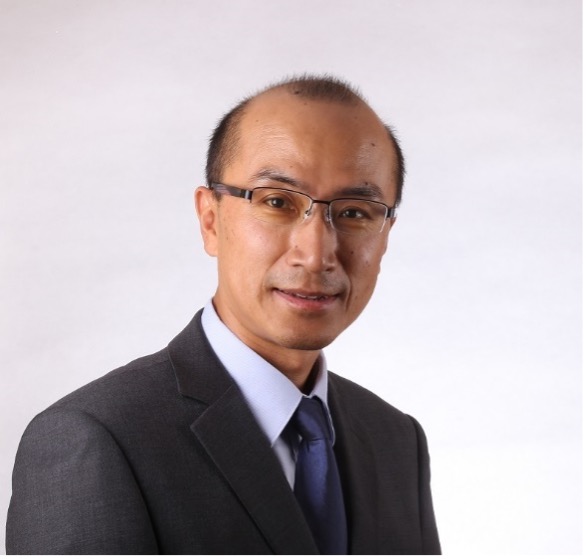
Mr. Qiang Shi
Mr. Shi currently serves as the Deputy Director of the Hong Kong Marine Department, where he leads the Local Vessels and Examination Division, Multi-lateral Policy Division, Port Control Division, and Shipping Division. Mr. Shi began his career onboard container ships as a deck officer. After obtaining his Master Mariner qualification, he transitioned ashore and held managerial positions with major shipping companies, focusing on crew manning and marine operations. In 2007, Mr. Shi joined the Marine Department as a government surveyor. Throughout his tenure, he has handled a diverse range of responsibilities, including port state control, flag state administration, marine legislation, seafarers training and certification, and local vessel safety, among others.

Mr. Jiajing Chen
CHEN Jiajing is a PhD student in the Division of Environment and Sustainability (ENVR) at the Hong Kong University of Science and Technology (HKUST). He holds a master's degree in international shipping management, also obtained in Hong Kong, and has gained substantial experience in the shipping industry across both Mainland China and Hong Kong. His research and professional interests are centered on green and sustainable shipping practices, with a particular focus on the application of big data in the shipping industry.
Mr. Roy Zhong Qiao HU
Graduated from Dalian Maritime University in the 1990s, served onboard OOCL fleet 15 years. Currently, serve as senior superintendent of OOCL Fleet Management.
Mr. Hare Ram Sah
General Manager, Venture Marine Services Limited, (a Wah Kwong Group company ) , since 2024. Chairman of "Technical Committee of Wah Kwong"
Joined Wah Kwong as Fleet Manager in year 2012, Fleet Director from 2018 to 2024. Ship Management Experience on diversified group of vessels, consisting Tankers, Bulkers, Containers (Oil, Gas, LNG, Chemical, Bulkers, Containers Vessels). Actively participates in industry groups to work on decarbonization solutions, including chair of " IMO EEXI and CII Working Group” of the RINA Asia Decarbonisation Committee, member of Hong Kong Technical committees of Class ABS, BV, LR and DNV, and member of Marine Nuclear Application Group (ABS). Project lead of the Carbon Capture Utilisation and Storage, feasibility studies (retrofit on existing fleet), and contributing in joint studies on alternate fuels related to methanol, ammonia, Hydrogen and various innovative technologies. Spoke at Government inter-departmental “Carbon Neutrality Task Force” led by Environmental Protection Department. Recently presented half day lecture / training on LNG tankers to HK Mardep.
Kunsong Chen
General Manager, WINGD Hong Kong Branch.
Mr. Chen starts his career by join New Sulzer Diesel Switzerland in 1990, with 35 years’ experiences in various fields of marine industry.
Ms. Gao, Yuan Xue Rachel
Rachel joined DNV in 2012 and has since held various technical roles spanning engineering software, hydrodynamic and structural analysis, ship energy efficiency, and maritime decarbonization. From 2020 to 2024, she was part of the DNV Maritime Smart Center, where she played a pivotal role in advancing maritime decarbonization. Her work included co-developing business opportunities, initiating pioneering industry collaborations, and bridging DNV’s global innovation with major Chinese stakeholders across the maritime value chain. She led and contributed to key initiatives with leading shipowners and shipyards on fuel transition, carbon risk assessment for newbuilds and retrofits, fleet GHG management, and cross-sectoral partnerships.
Since May 2025, Rachel has taken on the role of Business Development Manager – Innovation and Market Development. In this capacity, she focuses on leveraging emerging technologies and future market trends to position DNV as a trusted advisor and thought leader in Greater China, aligning DNV’s global maritime innovation with local market needs.

Mr. Martin Cresswell
Martin is a Marine Engineer who has over 40 years’ experience, operating, managing and building merchant ships. He was a Board Member of the China Navigation Company, a British Shipowner, part of the Swire Group, for 15yrs before retiring in November 2016. Martin is currently the Technical Director of the Hong Kong Shipowners Association and continues to work in shipping in various technical roles.
Mr. Sanjay Relan
Ex-Marine Chief Engineer with deep interest in the commercial sides of shipping having qualified as a member, Institute of Chartered Shipbrokers (MICS).
After 14 years at sea, started his shore-based journey as a new building supervisor. He has been in the technical ship management space for 19 years, including plan approvals of new buildings. Passionate about alternate fuels and the ongoing energy revolution, he has been for the past 6 years, Head of Decarbonisation at Pacific Basin Shipping (Hong Kong) Ltd strategizing and implementing energy saving initiatives and presently heading the alternate dual fuel methanol new building team as well.
Past member of the working group at Intercargo for “EEXI” and ‘Fuel Lifecycle GHG analysis’, and BIMCO documentary committee for “Energy Efficiency Data Sharing Clause for Time Charter Parties”
Present member of the BIMCO documentary committee for “Retrofit Benefit Sharing Clause for Time Charter Parties.
Mr. Mark Teng
Mark Teng joins SeaKapital with over 25 years of corporate and structured finance experience.
He is the former Managing Director of Asia Ship Finance at Credit Agricole Corporate and Investment Bank, responsible for the origination and distribution of various ship finance facilities (including senior secured debt, export credit agency loans, non-recourse shipping funds, tax leases, and bonds).
In addition, Mark brings sector-specific expertise in corporate/loan restructuring and M&A advisory. He is a graduate of the University of Pennsylvania, with a B.A. in International Studies plus a B.S. in Economics from the Wharton school.
Ms. Siti Noraini Zaini
Siti joined IBIA in July 2022 as Regional Manager, Asia, after more than 10 years with the Singapore Shipping Association (SSA).
At SSA, Siti managed stakeholders’ engagements and was the Secretary of the various Committees and Sub-Committees, including the SSA Marine Fuels Committee where she led and develop various initiatives such as the MPA-SSA IMO 2020 Conference, and most recently, an information pack on the Biofuels Bunkering in the Port of Singapore.
During the COVID-19 pandemic, she was part of the working group(s) which developed the Singapore Crew Change Guidebook and seafarers’ vaccination in Singapore (SeaVax). The working groups were recognised for the efforts and contributions with the Minister’s Innovation Award and Star Partner Award (Public Sector Transformation Awards).
Siti holds a degree in Naval Architecture/Offshore Engineering with Newcastle University (UK) and a Graduate Diploma in Maritime Law and Arbitration from the National University of Singapore (NUS).
Mr. Siva Nangapan
Siva Nangapan is a seasoned marine professional with over 15 years of experience in the bunker industry, currently serving with Lloyd’s Register FOBAS. His expertise spans both quantity and quality assurance, with a strong focus on claims investigations and dispute resolution in bunker deliveries.
Beyond his fieldwork, Siva has held key roles in operations management and product development, leading initiatives such as Ballast Water Management setups. He currently serves as the ADP technical lead in Lloyd’s Register’s ADP collaboration.
He was also instrumental in lobbying for training programs for surveyors in Singapore during the early stages of mandating Mass Flow Meter (MFM) use - an effort that helped lay the foundation for more transparent and accountable bunkering practices.
Holding a Diploma in Maritime Studies and an Advanced Diploma in Business Management, Siva is a passionate advocate for efficient bunker delivery frameworks that enable all parties to seek fair recourse. He emphasizes the critical role of surveyors not only in verifying quantities but also in ensuring fuel quality - an increasingly vital aspect in the era of green shipping and decarbonization.
Mr. Daryl LIm
Daryl Lim is the Quality Manager at Metcore International Pte Ltd, specialising in conformity assessment and the formalisation of technical procedures for the bunkering industry. He led Metcore’s team in achieving ISO/IEC 17065 accreditation for Mass Flow Metering Systems (MFMS) certification and contributes actively to standards development, including Singapore Standard SS648 and ISO 22192. With extensive experience in fuel measurement compliance, Daryl plays a key role in advancing transparency and trust in global bunkering practices.
Mr. Vernon Tsang
Mr. Tsang began his career in shipping and logistics industry. After obtaining his Master of Business in 2011, he transited to marine fuel industry. Currently he is the Sales and Marketing Director of the Bunker Department of Chimbusco Pan Nation Petro-Chemical Co., Ltd. (CPN), overseeing bunker sales and trading activities not only in Hong Kong, but also major ports around the world. Renowned for his deep understanding of the bunker market, he is instrumental in collaborating with the Alternative Fuel Team of CPN to drive the business transformation towards green energy.
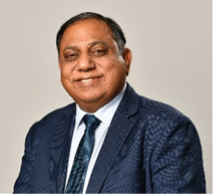
Mr. Prakash Chandra
Prakash Chandra is a seasoned expert in the marine industry with 34 years of experience. He holds a Bachelor of Engineering in Marine Engineering from DMET India, a Diploma in LNG Shipping from the University of Portsmouth, and has completed Executive Education in Business Management at NUS Business School, Singapore. Chandra's career includes 12 years at sea, 2 years as a Marine Surveyor with ABS, and 20 years as a Vessel Manager. He specializes in the technical management of specialized fleets such as LNG, LPG, and various tankers, as well as new building supervision. Notably, he led projects on methanol-fueled vessel operations and ammonia as fuel. Actively engaged in zero-carbon shipping initiatives, Chandra collaborates with international consortiums like SABRE, RADIUS, and WAVE, and serves on the Gas Committee at Intertanko, promoting sustainability in the industry.
Mr. Darrick Pang
Darrick Pang is the Managing Director of Metcore International Pte Ltd, a leading conformity assessment body in the marine bunkering. He founded Metcore in 2013 to provide independent and trusted expertise in complete fuel measurement solutions for the bunkering industry. With over 30 years of experience in supply chain, technical, and operational roles at a major international oil and gas company, Darrick is a recognized pioneer in oil loss management and the introduction of mass flow metering (MFM) systems in Singapore’s bunkering sector. His contributions were instrumental in MFM systems which is mandated in Singapore since 2017, setting a global benchmark for bunkering transparency and efficiency.
Darrick’s exceptional work in fuel measurement and metrology has earned him multiple industry merits, including: • ExxonMobil President’s Award (2012); • Minister’s Innovation Award (Distinguished Award) – Ministry of Transport (2012) for contributions to the "Use of Mass Flow Metering for Bunker Delivery in Singapore" project; • Quality & Standards Commendation Award – Singapore Standards Council & Enterprise Singapore (2019) A highly respected industry expert, Darrick plays a pivotal role in the development of global bunkering standards, serving as: • Convenor of the Working Group on SS648 – leading the latest revisions in bunker mass flow metering standards to ensure operational efficiency and industry alignment; • Chairman of the National Mirror Committee for ISO/TC 28/SC 2/WG 13 (Marine Bunkering); • Technical Committee Member for Bunkering; • Contributor to ISO 22192:2021 & ISO 21562:2020 on MFM system requirements and shipboard fuel measurement Actively engaged in industry leadership and advocacy, Darrick is a member of: • SSA Marine Fuels and Energy Committee; • InterTanko’s Bunker Sub-Committee; • IBIA’s Bunker Licensing & MFM Workgroup
He remains dedicated to driving industry excellence while shaping the future of marine fuel supply worldwide.
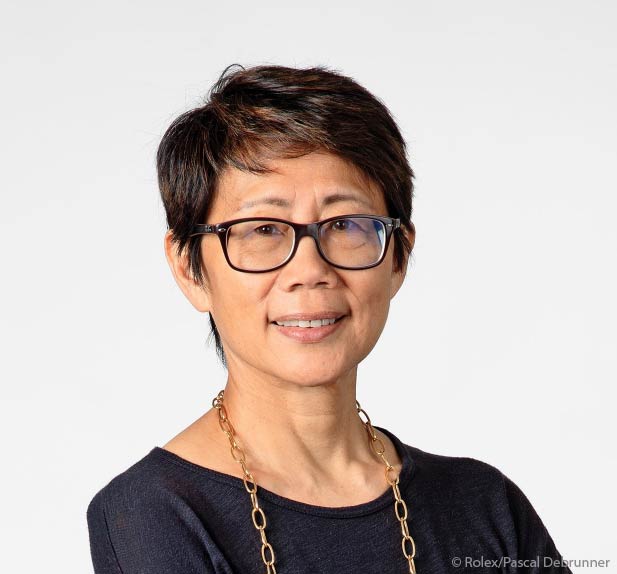
Prof. Christine Loh
Prof. Christine Loh is the Chief Development Strategist at the Institute for the Environment, Hong Kong University of Science and Technology (HKUST). Previously, she held the positions of Special Consultant to the Office of the Chief Executive of the HKSAR Government on the ecological civilization aspects of the Greater Bay Area Outline Development Plan (2019-2020); and Under Secretary for the Environment in the HKSAR Government (2012-2017). She was the CEO of Civic Exchange, an independent non-profit public policy think tank (2000-2012). Before that, Prof. Loh served as a member of the Hong Kong Legislative Council, first appointed in 1992 and later elected in 1995 and 1998. Earlier, she spent 14 years in the private commercial sector in commodities trading. Currently, she is a Director of New Forests Pty Limited, Towngas Smart Energy Company Limited, CDP Worldwide, and Global Maritime Forum. She is also a founding Advisor to Hong Kong Green Finance Association.
